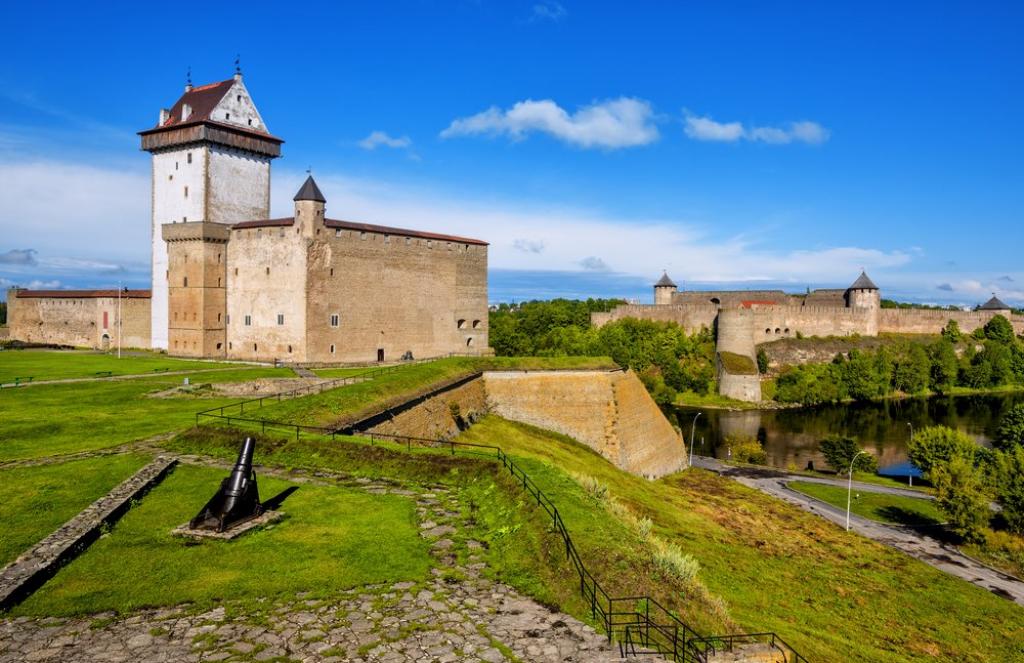Thessaloniki gets ready for its metro launch in November
The underground rapid transit lines have been under construction for almost two decades due to various project delays
 TheMayor.EU logo
TheMayor.EU logo 
Two castles stand at the border, the one on the left is in Estonia, the other one in Russia, Source: Depositphotos
The country now joins Finland in urging the EU to stop the issuing of Schengen visas to Russian citizens
Estonia is about to become the first country, which will effectively ban the entry of Russian citizens to its territory after its government announced earlier today that it has approved a restriction to that effect to go into force from 18 August. The decision, however, comes with an important caveat that only Russian citizens holding Estonian-issued Schengen visas will not be allowed to enter the country.
This still means that Russian travellers with visas issued from other EU countries will be able to enter and transit the territory of the Baltic state. On that account, however, the Estonian government has joined their Finnish counterparts in calling on the EU to take up a unified position and adopt a wholesale sanction on tourism to the Schengen area from Russia.
“We have seen an enormous rise in the number of Russian citizens coming into or passing through Estonia,” said Minister of Foreign Affairs Urmas Reinsalu, in a government press release. “The possibility they have to visit Estonia, or other parts of Europe via Estonia, en masse is not in line with the principles of the sanctions we have imposed. In implementing them, Estonia sought to restrict the ability of the aggressor state to carry on with ordinary international life at the levels of both the state and its citizens.”
Minster Reinsalu added that Estonia will also cease issuing to citizens of the aggressor state exceptional visas for working, studying and doing business in the country.
The restrictions, however, will not affect Russian citizens whose homeland is Estonia or who are permanent residents of the country. Likewise, a special provision will be made for those Russian students studying in the Baltic country who have not managed to complete their studies yet.
The other exceptions to the rule include:
The Baltic countries, together with Finland, are turning into the most prominent advocates for putting a clamp on the flow of Russian tourism to the European Union. A big part of the reason for this is the fact that after flights between the EU and Russia were cancelled in the wake of the military invasion in Ukraine, Russian travellers simply turned to overland border crossings as their only remaining way to go on a European vacation.
Finland and the Baltic countries are the only EU countries bordering Russia and Belarus (though Poland also borders the Russian exclave of Kaliningrad) and have thus become transit points for Europe-bound Russian tourism.

The underground rapid transit lines have been under construction for almost two decades due to various project delays

Now you can get your wine in Talence by paying directly in Bitcoin

That’s because the state has to spend money on updating the railway infrastructure rather than subsidizing the cost of the popular pass

Rethinking renewable energy sources for the urban landscape

The examples, compiled by Beyond Fossil Fuels, can inform and inspire communities and entrepreneurs that still feel trepidation at the prospect of energy transition

Now you can get your wine in Talence by paying directly in Bitcoin

The 10th European Conference on Sustainable Cities and Towns (ESCT) sets the stage for stronger cooperation between the EU, national and local level to fast track Europe's transition to climate neutrality.

At least, that’s the promise made by the mayor of Paris, Anne Hidalgo

The underground rapid transit lines have been under construction for almost two decades due to various project delays

At least, that’s the promise made by the mayor of Paris, Anne Hidalgo

Hostal de Pinós is located in the geographical centre of the autonomous region

Despite its church-y name, the district has long been known as the hangout spot for the artsy crowds

Urban dwellers across the EU are having a say in making their surroundings friendlier to people and the environment.

Forests in the EU can help green the European construction industry and bolster a continent-wide push for architectural improvements.

Apply by 10 November and do your part for the transformation of European public spaces

An interview with the Mayor of a Polish city that seeks to reinvent itself

An interview with the newly elected ICLEI President and Mayor of Malmö

A conversation with the Mayor of Lisbon about the spirit and dimensions of innovation present in the Portuguese capital














